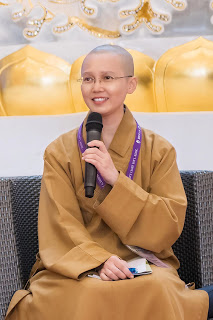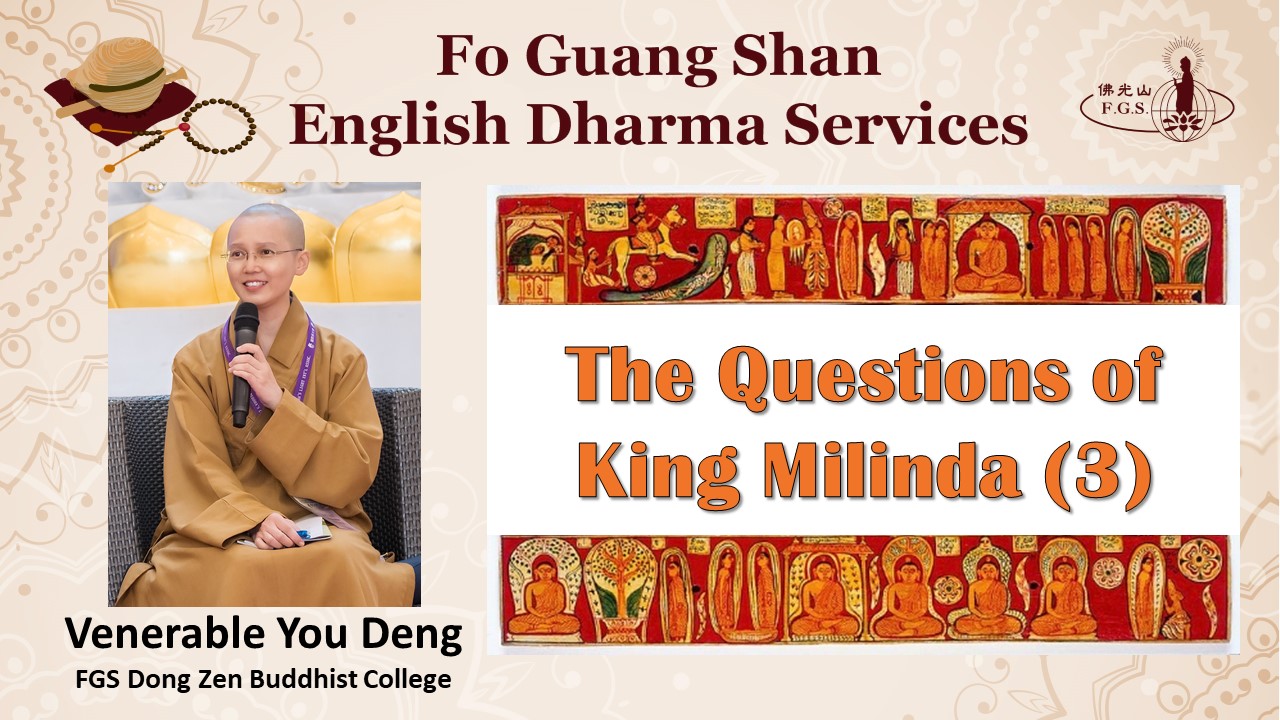
Speaker: Ven. You Deng
Fo Guang Shan Dong Zen Buddhist College, Malaysia
I. Introduction
Auspicious blessings to all Dharma friends. Welcome to Fo Guang Shan English Dharma Services Channel. This is You Deng from Dong Zen Buddhist College Malaysia. Let’s continue the Questions of King Milinda.
II. The Question of Doing Good Deeds
The king asked Nagasena again, “Suppose a man were to do good deeds, should he do it before death or should he do it after death?”
“He should have done it before, because the good deeds done after death are not so beneficial to him, but the good deeds done before are beneficial to him.”
Then Nagasena asked the king, “Suppose, O great king, when you were thirsty and want to drink, and you ask your men to have a well dug out, could that meet the king’s thirst?”
“Certainly not, it cannot meet the immediate thirst of the king. The well should be dug beforehand.”
“It is the same with regard to a man, if a man were to do good deeds, he should have done it early. If he does it late, it is not beneficial to him.”
Nagasena again asked the king, “Suppose, when the king feels hungry, then he asks his men to plough the field, to manure it and to sow crops. Could his belly be filled by doing so?”
“Certainly not, there should be saving of grains.”
“It is the same with regard to a man, he should have done good deeds in advance. If he does good deeds only when he is in danger, it is not beneficial to him.”
Then Nagasena asked the king, “Suppose, the king has an opponent and when he suddenly confronts a battle without preparation, could the king order people to train horses, elephants and men in warfare and also to make weapons?”
The king replied, “No, those things should have been prepared in advance. Then the king could go out to the battle at any moment. If the war has broken out already, it is useless for the king to ask his people to train horses, elephants and men.”
Nagasena said, “Thus the Buddha has said in the scriptures, ‘People should strive to perform bodily good actions before (disaster strikes), as good actions performed afterwards are not useful or beneficial.’ You should not give up the right path and adopt the wrong path, do not follow the ignorant ones who discard good and performs evil and who have to lament and wail afterwards, it is of no use. People who discard righteousness and adopt crookedness are going to repent on their death-bed.”
“Excellent, Nagasena.”
III. The Question on Nirvana as Happiness
The king asked Nagasena, “Venerable Sir, does he who has not attained the path of nirvana know that nirvana is the ultimate happiness?”
Nagasena replied, “Yes, he knows it, though he has not attained nirvana, but he still knows that nirvana is happiness.”
“But how can he know that nirvana is happiness without attaining it?”
“Now what do you think, my king? Do those whose hands and feet have not been cut off, know how painful it would be to have them cut off?”
“Yes, though they have not had their hands and feet cut off, they still know the painfulness of cutting off their hands and feet.”
“But how do they know it is painful?” Nagasena asked
“Well, they know it by hearing the sounds of the lamentation of those whose hands and feet have been cut off.”
“Just so, my king, with regard to nirvana, it is by hearing the glad words of those who have attained nirvana, that they who have not attained nirvana, know that nirvana is the ultimate happiness. Because of this they believe it.”
IV. The Question on the Existence of the Buddha
The king asked Nagasena again, “Have you, Venerable sir, seen the Buddha?”
Nagasena replied, “No, Sir, I have not seen the Buddha, my king.”
“Then have your teachers seen the Buddha?”
“No, my king, my teachers also have not seen the Buddha.”
“Then Venerable Nagasena, since you and your teachers all have not seen the Buddha, there is certainly no Buddha.”
“But great king, have you seen the place where the five hundred waters come joining together?”
“No, I have not seen it.”
“Then have your father and grandfather seen the water?” “No, none of them have seen it.”
“Then, since you, your father and grandfather all have not seen the place where the five hundred waters come joining together, there is certainly no such a place in the world where five hundred waters come joining together.”
“Though, my father, grandfather and I have not seen such waters, there are definitely such waters.”
“In the same way, though my teachers and I have not seen the Buddha, definitely the Buddha existed,” Nagasena said.
V. The Question on The Question on the Knowledge of Rebirth
The king asked, “Does the man who is about to be reborn know that he will be reborn?”
Nagasena replied, “Yes, he who is to be reborn knows it.”
“But how can he know it?” the king asked.
“It is like the farming family which sows the seeds, and also it rains in time. Does the farming family know
that there will be plenty of grain?”
“Yes, they know that there will be plenty of grain.”
Then Nagasena said, “So does a man, my king, he who is about to be reborn knows that he will be reborn.”
VI. The Question on the Two Kinds of Tears
The king asked Nagasena, “A man cries and sheds tears on the death of his parents, another man also laments and sheds tears while listening to the teachings of the Buddha. In these two cases, are they different?”
Nagasena replied, “He who weeps for his parents is due to his attachment, his thinking of his grief, sorrow and suffering. This kind of sorrow is the sorrow of the ignorant people. He who weeps while listening to the sermon of the Buddha is full of compassion. As he thinks of the sufferings in the world, so his tears come out. He would obtain the great merit.”
VII. The Question on the Power of Single Mindfulness of the Buddha
The king asked Nagasena, “A man cries and sheds tears on the death of his parents, another man also laments and sheds tears while listening to the teachings of the Buddha. In these two cases, are they different?”
Nagasena replied, “He who weeps for his parents is due to his attachment, his thinking of his grief, sorrow and suffering. This kind of sorrow is the sorrow of the ignorant people. He who weeps while listening to the sermon of the Buddha is full of compassion. As he thinks of the sufferings in the world, so his tears come out. He would obtain the great merit.”
VIII. The Enlightenment of King Milinda
In the concluding section, Nagasena said, “It is past midnight, I have to go back.”
Then the king ordered his attendants to have four rolls of cloths dipped in oil to serve as torch and sent Nagasena to his temple saying,
“You all should respect and attend to Nagasena as if attending me.”
The attendants replied, “Yes, my king.”
The king said, “To have such a teacher as Nagasena and such a pupil like me, the realization of dharma will be quick.”
As all the king’s questions were given suitable answers by Nagasena, the king rejoiced. So the king ordered clothes worth 10,000 coins to be offered to Nagasena from the treasury.
The king said to Nagasena, ‘From now on, you, together with 800 ̌sramanas will be daily invited to my palace for meals and also provided with whatever you desire.”
Nagasena then told the king, “I am a recluse who has no desire.”
“Venerable Nagasena, you should protect yourself and also protect me.”
“What do you mean, my king, by protecting myself and you?”
“Because I am afraid that people would blame me of being miserly by saying, ‘Nagasena has solved the king’s doubts, but has not received anything from the king’. People might also blame you saying, ‘Nagasena was unable to solve the king’s doubts, so the king has not offered him anything.’”
The king continued, “If you, Venerable Nagasena, accept my present, I would earn great merit, and you would protect your fame as well. Just as a lion which is kept in a golden cage will always want to go out. Now, I am a king in the palace, but my mind is not happy. So I want to leave the country and learn the dharma.”
After the king had finished his speech, Nagasena got up and returned to the temple. When Nagasena had just left, the king pondered by himself over what questions he had asked Nagasena and what answers had been given by Nagasena.
Then the king thought, ‘The questions put by me were well replied to and explained by Nagasena.’ And Nagasena likewise, when he returned to the temple, thought the matter over to himself, ‘Whatever questions put to me by the king, I have replied them all.’
He thought to himself, ‘I explained all the questions put by the king.’ Nagasena thought over these matters until morning. The next day, Nagasena robed himself, took his begging bowl, entered the palace and sat in the royal Hall.
The king first paid homage to Nagasena, then sat down and said, ‘Venerable Nagasena, as soon as you had left, I thought to myself about what I had asked Nagasena and what Nagasena had replied. Then it occurred to me that whatever I asked, Nagasena explained them well. These thoughts kept me happy up to the morning.
Nagasena also said (to the king), ‘After I had returned to the temple, I also thought over what the king had asked me, and what I explained. I had explained all. These thoughts kept me happy up to the morning as well.’ Having said that, Nagasena wanted to depart, and the king paid homage to Nagasena.
At the conclusion between the king and Nagasena, the earth shook six times, lightning flashed, and the gods rained down flowers from heaven. Milinda was filled with joy in his heart and all his pride was subdued. He ceased to have any doubts about the Triple Gem and renounced all obstinacy, like a cobra deprived of its fangs.
He said, “Oh Venerable Nagasena, you have solved the puzzle that was worthy of the Buddha to solve. Among the Buddha’s followers, there is no one like you, except for Venerable Sariputra. Please forgive me for my faults. May you accept me as a follower as one gone for refuge for as long as life lasts.”
The king and his soldier supported the elder Venerable Nagasena and his large following, and had a dwelling place constructed named Milinda Vihara. Later, Milinda handed over his kingdom to his son and went forth into homelessness and he developed his insight and attained arhatship.
IX. Conclusion
Thank you for listening. This is the end of our session for today.
Let us join our palms and re-direct the joy and merits from this session, to all sentient beings, may all be well and happy.
Once again, thank you for joining us. If you find this dharma service is helpful to your practice, please subscribe to the Fo Guang Shan English Dharma Services Youtube channel and share it to your friends.
Last but not least, I wish you all stay safe, stay healthy and stay awesome. See you next week. Omitofo.

